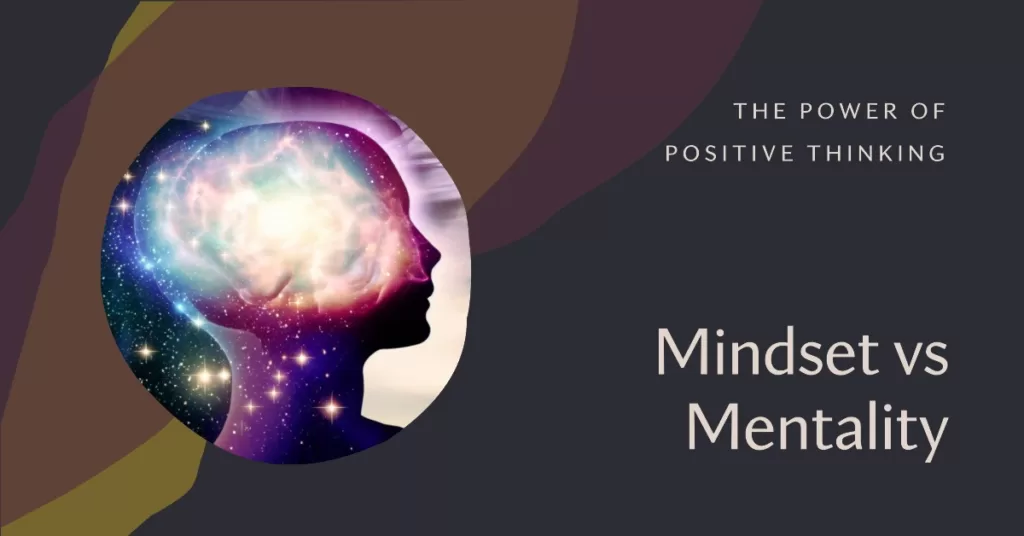Have you ever wondered if mindset and mentality are the same thing? Although these terms are often used interchangeably, they actually have distinct meanings. Understanding the differences between mindset and mentality can help you develop a positive outlook on life and achieve greater success.
Your mindset refers to your beliefs, attitudes, and thoughts about yourself and the world around you. It is shaped by your experiences, upbringing, and environment. On the other hand, your mentality is your overall way of thinking, how you handle things, and interact with the world around you. While both mindset and mentality play important roles in shaping who you are as a person, they each have their own unique impact on your life. By exploring these concepts more deeply, you can gain a better understanding of how to cultivate a healthy mindset and mentality for a more fulfilling life.
Table of Contents
Key Takeaways
- Mindset and mentality are two different concepts that influence our beliefs, attitudes, and overall approach to life.
- Mindset is shaped by experiences, upbringing, and environment, and can be changed with conscious effort.
- Mentality is influenced by a substantially larger amount of factors and coping mechanisms as it represents the overall way of thinking of an individual or a group. It is also harder to change as it is ingrained deeper.
- Cultivating a positive mindset and growth-oriented mentality can greatly impact emotions, behavior, and overall wellbeing, and involves prioritizing self-care, setting boundaries, and cultivating a supportive environment.
Definitions of Mindset and Mentality
Let’s break it down: mindset refers to one’s established beliefs and attitudes, while mentality is a broader term encompassing one’s overall mental state. A person’s mindset can be viewed as their perspective or outlook on life. It is shaped by past experiences, upbringing, cultural background, and personal values. For example, someone with a growth mindset believes that intelligence and abilities can be developed through hard work and dedication.
On the other hand, someone with a fixed mindset believes that their traits and abilities are predetermined and cannot be changed. This type of mindset can limit an individual’s potential for growth and success. In contrast to mindset, mentality encompasses all aspects of an individual’s mental state including emotions, thoughts, behaviors, and attitudes.
Mentality is influenced by various factors such as stress levels, physical health status, social support systems, coping mechanisms, and much more. As such, it can vary from moment to moment depending on environmental circumstances. While mindset refers more specifically to established beliefs and attitudes about oneself and the world around them; mentality encompasses all aspects of an individual’s mental state at any given time. Understanding both concepts can help individuals develop healthier perspectives toward themselves and others while fostering personal growth and success in various areas of their lives.
Differences Between Mindset and Mentality
You’re probably wondering how your way of thinking differs from your attitude and approach. Well, mindset and mentality may seem similar, but they have distinct differences. Mindset refers to the set of attitudes and beliefs that shape an individual’s way of thinking or approaching a situation. On the other hand, mentality refers to one’s overall mental state or disposition toward life.
To help you understand these differences better, let us look at the table below:
| Mindset | Mentality | |
|---|---|---|
| Scope | Narrow – focused on specific beliefs | Broad – covers overall mental state |
| Change | Can be changed with conscious effort | Harder to change as it is ingrained |
| Impact | Affects perception and decision-making | Also affects how certain things are done |
From the table above, we can see that while mindset is narrower in scope and can be changed with conscious effort and the mentality is broader in scope and harder to change as it is ingrained in our overall mental state.
Another significant difference between mindset and mentality is their impact on our lives. While a person’s mindset affects their perception and decision-making process, their mentality impacts their behavior and the way they approach things even in circumstances unrelated to emotions, perceptions, and beliefs. To give you a brief example, an open mindset is a way of thinking about the world around you. It states that you are open to new knowledge. On the other hand, the term “mathematical mentality” can be used toward describing a person who relies on the probability ratio, rather than on emotions, when making decisions. Even though a lot of factors and descriptions intertwine here, mindset, although similar, is not 100% the same as mentality – similarly to mindset and attitude, where attitude can be displayed toward a certain matter, e.g. “I don’t like going out”, while mindset represents a broader concept such as “I am an introvert, I believe that I can’t cope with other people, and I find them problematic.”
While all of these terms refer to an individual’s way of thinking or approaching situations in life, there are significant differences between them that affect our lives differently. Understanding these differences can help individuals develop strategies for improving their mindset or changing their mentality toward more positive outcomes.
How Mindset and Mentality Affect Your Life
Having a positive outlook on life and approaching situations with an open mind can greatly impact your emotions, behavior, and overall wellbeing. Your mindset and mentality play a crucial role in how you perceive the world around you. A positive mindset helps you stay optimistic even when things don’t go as planned, while a negative one can make you feel defeated before even trying.
Your mentality refers to your general attitude toward yourself, life, and the world around you. It is shaped by your experiences, beliefs, values, and cultural background. For instance, if you grew up in an environment where failure was stigmatized or discouraged, you might have developed a fixed mindset that sees challenges as threats rather than opportunities for growth. On the other hand, if you were taught to embrace challenges as learning experiences and to persist despite setbacks, you might have developed a growth mindset that sees potential for improvement in every situation.
Your mindset is more specific than your mentality and refers to how you approach individual situations. For example, if you are faced with a difficult task at work or school, having a growth mindset means believing that with effort and practice, you can improve your skills and achieve success. Conversely, having a fixed mindset means believing that your abilities are predetermined and unchangeable – so why bother trying?
Cultivating a positive mindset and growth-oriented mentality can help improve your emotional wellbeing, behavior toward others and yourself as well as overall quality of life. Adopting these perspectives toward both big-picture attitudes like failure or everyday tasks such as work assignments will leave room for greater success without fear of judgment or criticism from oneself which may decrease motivation over time!
Developing a Positive Mindset
To cultivate a positive outlook on life, it’s important to focus on the things that bring you joy and gratitude.
Here are three steps you can take to develop a more positive mindset:
- Practice gratitude: Take some time each day to reflect on what you’re grateful for in your life. This could be anything from having a roof over your head to having loving friends and family members.
- Reframe negative thoughts: Whenever you find yourself thinking negatively about something, try reframing it in a more positive light. For example, instead of thinking “I’m never going to be able to accomplish this”, try thinking “I may face challenges along the way, but I can do this.”
- Surround yourself with positive people: The people we surround ourselves with have a huge impact on our mental state. Spend time with people who lift you up and support your goals and dreams.
By taking these steps toward developing a positive mindset, you can start to see real changes in your life. You’ll be better equipped to handle challenges that come your way and will feel happier and more fulfilled overall.
Remember that developing a positive mindset is an ongoing process – it won’t spontaneously happen overnight. But by committing yourself to these practices daily, you’ll be well on your way toward living a happier, more fulfilling life.
Developing a Healthy Mentality

When it comes to developing a healthy mentality, prioritizing self-care should be at the top of your list. This means taking time for yourself and engaging in activities that promote wellbeing and relaxation. Additionally, setting boundaries is crucial to maintaining a positive mindset – knowing when to say “no” and avoiding overcommitment can prevent burnout and stress. Finally, cultivating a supportive environment by surrounding yourself with people who uplift you and provide encouragement can greatly impact your mental health in a positive way.
Prioritizing Self-Care
By taking care of yourself, you can prioritize your mental and physical health. Self-care is a crucial part of developing a healthy mentality, as it allows you to recharge your batteries and be ready to take on the world with renewed vigor. Whether it’s taking a relaxing bath, practicing yoga, or reading a good book, self-care activities can help reduce stress and improve overall wellbeing.
Prioritizing self-care doesn’t mean neglecting other responsibilities or relationships. Instead, it means recognizing that investing in yourself will ultimately benefit all aspects of your life. By carving out time for self-care, you are giving yourself permission to prioritize your own needs and desires. Remember that taking care of yourself isn’t selfish – it’s necessary for personal growth and happiness.
Setting Boundaries
Setting boundaries is like building a fence around your personal space, allowing you to protect your mental and emotional wellbeing from external stressors. This means that it’s important to set limits on what you’re willing to tolerate from others, whether it be in the workplace or in personal relationships.
Here are three tips for setting boundaries:
- Be clear about what behaviors are acceptable: It’s important to clearly communicate with others about what behaviors you find unacceptable, and why they are harmful to your wellbeing.
- Practice saying “no”: Saying no can be difficult, but it’s an important part of setting boundaries. Remember that by saying no, you’re taking care of yourself and protecting your own needs.
- Take time for self-reflection: Before setting boundaries, take some time to reflect on what you need from the situation or relationship. This will help you identify where your personal limits lie and allow you to communicate them more effectively with others.
Remember that setting boundaries is not about being selfish or rude – it’s about taking care of yourself so that you can show up as the best version of yourself in all areas of life. By prioritizing self-care through boundary-setting, you’ll feel empowered and free to live life on your own terms.
Cultivating a Supportive Environment
You can create a positive atmosphere around you by surrounding yourself with people who uplift and motivate you, making it easier to achieve your goals. Be intentional about the company you keep and seek out those who share similar values and aspirations. Avoid spending time with individuals who constantly bring negativity into your life or discourage you from pursuing your dreams.
It’s important to remember that a supportive environment is not just about the people in it, but also about the physical spaces and resources available to you. Consider joining groups or organizations that align with your interests, attending events or workshops that inspire personal growth, or even creating a designated space in your home for relaxation and reflection. By cultivating an environment that supports your mindset and mentality, you’ll be better equipped to overcome challenges and reach success on your own terms.




